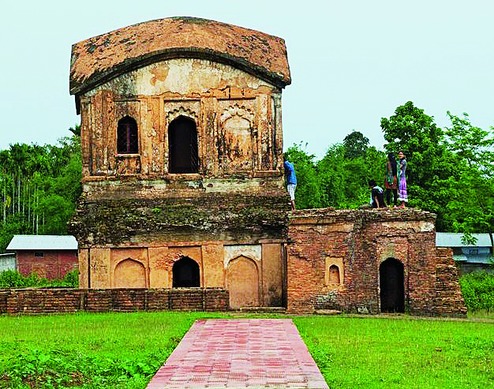
Hailakandi: The Dimasa Royal Capital Protection Committee, Dimasa Historical Foundation and prominent residents of the Dimasa community demanded the preservation of the remains of the last Dimasa kingdom at Khaspur.
They have submitted a memorandum to the chairman of Maulana Abul Kalam Azad Institute of Asian Studies, an autonomous body under the Union ministry of culture.
The memorandum also demanded a museum and Dimasa cultural centre at Khaspur.
The site can be developed into an important tourist hotspot and the memorandum requested to take necessary steps to boost tourism.
Khaspur, located 25km from Silchar town, was the capital of the 19th century Kachari kingdom (also known as Dimasa kingdom).
During the start of the Dimasa rule, Dimapur used to be the capital of the kingdom, which was later moved to Maibang (now in Dima Hasao district) in Assam before finally being moved to Khaspur (locally known as Rajbari, meaning the King's palace) in Cachar district.
Khaspur clearly reflects the rich cultural heritage of Assam and the main relics include the sun gate, lion gate, king's temple and main gate.
The lack of infrastructure and negligence drove this majestic palace into oblivion, said a local resident, Nupur Barman.
Rani Chandrabha Hasnu Park, named after a Kachari queen and also located in the area, is also uncared for, he alleged.
According to date, Kachari king Tamradhaja's kingdom was invaded by the most powerful Ahom king, Rudra Singha, in December 1706.
Defeated by the Ahom king, Tamradhaja fled south to Khaspur.
The Kachari princes settled in the plains of Cachar with their court at Khaspur. It was originally named the Hirimba kingdom in memory of Hirimba, the wife of the Pandava Bhima, who was said to have resided in the region.
King Suradarpa Narayan constructed brick palaces and temples in different parts of Khaspur.
The last of the Kachari Kings, Raja Gobin Chandra, was assassinated by a group of seditious people along with some of his personal attendants on April 24, 1830, at Haritikar in Cachar.
In the absence of natural heirs, his kingdom lapsed to the British under the terms of an agreement executed in 1826.
At present, three staff members and five workers of the Archaeological Survey of India (ASI) look after the remains maintained by ASI and the government of Assam.
The chairman and director of the institute, Sujit Kumar Ghosh and Vinay Kumar Srivastava, respectively visited the site and met the representatives of various organisations.
It has been decided to organise a seminar-cum-workshop for researchers at the site shortly.
The officials agreed to provide funds for the purpose and a convener's committee was also formed with BJP state committee spokesperson Rajdeep Roy as its head.











